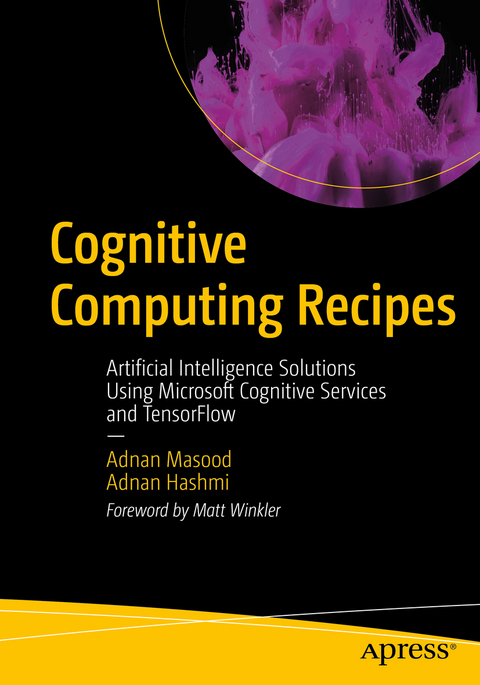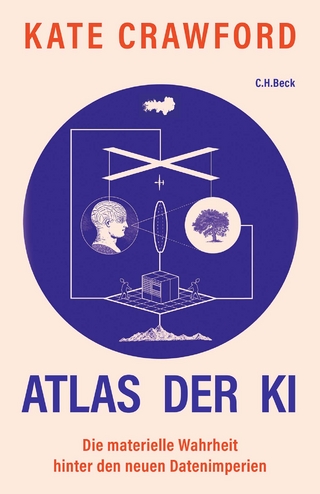
Cognitive Computing Recipes
Apress (Verlag)
978-1-4842-4105-9 (ISBN)
- Covers multiple paradigms including on-premise, in the cloud, and hybrid
- Contains concise, hands-on, enterprise ready machine learning recipes for the uninitiated
- Comprises both deep learning and machine learning, with examples using TensorFlow and CNTK
Solve your AI and machine learning problems using complete and real-world code examples. Using a problem-solution approach, this book makes deep learning and machine learning accessible to everyday developers, by providing a combination of tools such as cognitive services APIs, machine learning platforms, and libraries.
Along with an overview of the contemporary technology landscape, Machine Learning and Deep Learning with Cognitive Computing Recipes covers the business case for machine learning and deep learning. Covering topics such as digital assistants, computer vision, text analytics, speech, and robotics process automation this book offers a comprehensive toolkit that you can apply quickly and easily in your own projects. With its focus on Microsoft Cognitive Services offerings, you'll see recipes using multiple different environments including TensowFlow and CNTK to give you a broader perspective of the deep learning ecosystem.
You will learn how to
- Build production-ready solutions using Microsoft Cognitive Services APIs
- Apply deep learning using TensorFlow and Microsoft Cognitive Toolkit (CNTK)
- Solve enterprise problems in natural language processing and computer vision
- Discover the machine learning development life cycle - from formal problem definition to deployment at scale
This book is for Software engineers and enterprise architects who wish to understand machine learning and deep learning by building applications and solving real-world business problems.
Adnan Masood, Ph.D. is an artificial intelligence and machine learning researcher, software architect, and Microsoft MVP (Most Valuable Professional) for Data Platform. He currently works at UST Global as Chief Architect of AI and Machine Learning, where he collaborates with Stanford Artificial Intelligence Lab, and MIT AI Lab for building enterprise solutions. Author of Amazon bestseller in programming languages, Functional Programming with F#, Dr. Masood teaches data science at Park University, and has taught Windows Communication Foundation (WCF) courses at the University of California, San Diego. He is a regular speaker to various academic and technology conferences (WICT, DevIntersection, IEEE-HST, IASA, and DevConnections), local code camps, and user groups. He also volunteers as STEM (Science Technology, Engineering and Math) robotics coach for elementary and middle school students.
Adnan Hashmi has 20 years' experience in the technology industry working with a host of clients in healthcare, finance, construction, and consulting. He currently works at Microsoft data and AI space, engaging with financial services clients. He holds a Master's degree in software engineering from the Shaheed Zulfikar Ali Bhutto Institute of Science & Technology (SZABIST), Karachi, Pakistan, and is passionate about machine learning, music, and education.
Chapter 1: Democratization of AI using Cognitive ServicesChapter Goal: Provide an overview of the current A
I and machine learning landscape; discuss machine learning and deep learning platforms including Microsoft, AWS, and GCP. Discuss Watson, H2O and cloud offerings for powerful artificial intelligence algorithms for vision, speech, language, and knowledge. Explain how these tools help providing algorithms, APIs, development and training toolkits, data, as well as computing power to design, train, and deploy models into applications, processes, and other machines for prediction or classification. Provide coverage of popular machine learning and deep learning platforms and frameworks with machine learning development lifecycle.
1.Democratization of Artificial Intelligence
2.Tribes of Machine Learning & Deep learning
3.A business case for Artificial Intelligence
4.AI in the enterprise - How Machine learning is impacting different industry sectors and what are the opportunities
5.On-Premise Platforms and Libraries - An Enterprise Perspective
6.Head in the cloud - Cognitive Services offerings in the cloud.
Chapter 2: Building Conversational Interfaces Chapter Goal: Introduce building conversational interfaces with practical recipes i.e. how to perform sentiment analysis for customer service, how to enable natural and contextual interaction, multi-turn dialogs, from simple chatbots to advanced systems that can network with humans and run in co-pilot mode to assist with supervised learning.
1.Bot Frameworks Overview and conversational interfaces.
2.Building Conversational Bots using Cognitive Services & Bot Framework
3. Building personas, conversations design, entity and intent detection.
4. Image based Q&A. Building FAQs and omni-channel interfaces
Chapter 3: Seeing is Believing - Custom VisionChapter Goal: Computer Vision API are used to extract rich information from images about their visual contents, which can be used for various business use cases. From reading text in images to recognizing celebrities and landmarks and analyzing videos in near real-time, Microsoft cognitive service and custom vision models delivers real-business value to everyday use cases.
1.Using Cognitive Services Vision API for object detection and tagging
2.OCR, and hand writing recognition. MNIST with Keras and Tensorflow
3. Hot Dog & Not Hot-dog - Custom Vision service for training your own models
Chapter 4: Text Analytics - The Dark Data Frontier Chapter Goal: This chapter introduces the reader with recipes around text analytics including unstructured text processing, text summarization, Natural Language Generation, Natural language processing (NLP) i.e. understanding of sentence structure and meaning, sentiment analysis, intent detection through API, and machine learning methods. This chapter also covers Stanford AI Lab's Deep Dive, Snorkel and Data Programming Model.
1. NLP, NLU, Parsing, Tokenization, Stemming, Term Reduction, Topic Modeling, POS Tagging using current frameworks including CoreNLP, NLTK, and Cognitive Toolkit.
2. Key phrase. Language, and sentiment analysis using Text Analytics API
3. Text Classification, Summary generation, Similarity analysis, clustering, semantic and sentiment analysis using Word2Vec, spaCy, Genism, and TensorFlow.
Chapter 5: Cognitive RPA - Automate This!
Chapter 6: Knowledge Management and Intelligent Search
Chapter 7: Predictive Analytics in Operations
Chapter 8: AI use cases in Industry
Appendix A: Microsoft Cognitive Toolkit Cheatsheet
Appendix B: Tensorflow Getting Started Guide with TFLearn and Keras
| Erscheinungsdatum | 25.02.2019 |
|---|---|
| Zusatzinfo | 354 Illustrations, black and white |
| Verlagsort | Berkley |
| Sprache | englisch |
| Maße | 178 x 254 mm |
| Gewicht | 839 g |
| Einbandart | kartoniert |
| Themenwelt | Mathematik / Informatik ► Informatik ► Programmiersprachen / -werkzeuge |
| Mathematik / Informatik ► Informatik ► Software Entwicklung | |
| Informatik ► Theorie / Studium ► Künstliche Intelligenz / Robotik | |
| Schlagworte | Artificial Intelligence • cognitive computing • Cognitive Toolkit • Deep learning • knowledge management • machine learning • Microsoft • Natural Language Processing • tensorflow • text analytics |
| ISBN-10 | 1-4842-4105-3 / 1484241053 |
| ISBN-13 | 978-1-4842-4105-9 / 9781484241059 |
| Zustand | Neuware |
| Informationen gemäß Produktsicherheitsverordnung (GPSR) | |
| Haben Sie eine Frage zum Produkt? |
aus dem Bereich


